Featured Posts

- Index of Psychological Studies of Presidents and Other Leaders Conducted at the Unit for the Study of Personality in Politics
- The Personality Profile of U.S. Supreme Court Associate Justice Brett Kavanaugh
- The Leadership Style of North Korean Leader Kim Jong-un
- North Korea Threat Assessment: The Psychological Profile of Kim Jong-un
- Russia Threat Assessment: Psychological Profile of Vladimir Putin
- The Personality Profile of 2016 Republican Presidential Candidate Donald Trump
- Donald Trump's Narcissism Is Not the Main Issue
- New Website on the Psychology of Politics
- Unit for the Study of Personality in Politics --- 'Media Tipsheet'
categories

- Afghanistan (228)
- Al Gore (2)
- Amy Klobuchar (4)
- Ayman al-Zawahiri (7)
- Barack Obama (60)
- Ben Carson (2)
- Bernie Sanders (7)
- Beto O'Rourke (3)
- Bill Clinton (4)
- Bob Dole (2)
- Campaign log (109)
- Chris Christie (2)
- Chuck Hagel (7)
- Criminal profiles (8)
- Dick Cheney (11)
- Domestic resistance movements (21)
- Donald Trump (31)
- Economy (33)
- Elizabeth Warren (4)
- Environment (24)
- George H. W. Bush (1)
- George W. Bush (21)
- Hillary Clinton (9)
- Immigration (39)
- Iran (43)
- Iraq (258)
- Jeb Bush (3)
- Joe Biden (13)
- John Edwards (2)
- John Kasich (2)
- John Kerry (1)
- John McCain (7)
- Kamala Harris (5)
- Kim Jong-il (3)
- Kim Jong-un (11)
- Law enforcement (25)
- Libya (18)
- Mahmoud Ahmadinejad (6)
- Marco Rubio (2)
- Michael Bloomberg (1)
- Michele Bachmann (173)
- Mike Pence (3)
- Military casualties (234)
- Missing person cases (37)
- Mitt Romney (13)
- Muqtada al-Sadr (10)
- Muslim Brotherhood (6)
- National security (16)
- Nelson Mandela (4)
- News (5)
- North Korea (36)
- Osama bin Laden (19)
- Pakistan (49)
- Personal log (25)
- Pete Buttigieg (4)
- Presidential candidates (19)
- Religious persecution (11)
- Rick Perry (3)
- Rick Santorum (2)
- Robert Mugabe (2)
- Rudy Giuliani (4)
- Russia (7)
- Sarah Palin (7)
- Scott Walker (2)
- Somalia (20)
- Supreme Court (4)
- Syria (5)
- Ted Cruz (4)
- Terrorism (65)
- Tim Pawlenty (8)
- Tom Horner (14)
- Tributes (40)
- Uncategorized (50)
- Vladimir Putin (4)
- Xi Jinping (2)
- Yemen (24)
Links

archives

- November 2021
- January 2021
- November 2020
- October 2020
- September 2020
- August 2020
- July 2020
- April 2020
- March 2020
- February 2020
- January 2020
- December 2019
- October 2019
- July 2019
- May 2019
- April 2019
- March 2019
- February 2019
- January 2019
- December 2018
- September 2018
- August 2018
- July 2018
- June 2018
- April 2018
- March 2018
- February 2018
- January 2018
- August 2017
- July 2017
- June 2017
- May 2017
- April 2017
- February 2017
- January 2017
- December 2016
- November 2016
- October 2016
- September 2016
- August 2016
- July 2016
- June 2016
- May 2016
- April 2016
- March 2016
- February 2016
- January 2016
- December 2015
- November 2015
- October 2015
- September 2015
- August 2015
- July 2015
- June 2015
- May 2015
- April 2015
- March 2015
- February 2015
- January 2015
- December 2014
- November 2014
- October 2014
- September 2014
- August 2014
- July 2014
- June 2014
- May 2014
- April 2014
- March 2014
- February 2014
- January 2014
- December 2013
- November 2013
- October 2013
- September 2013
- August 2013
- July 2013
- June 2013
- May 2013
- April 2013
- March 2013
- February 2013
- January 2013
- December 2012
- November 2012
- October 2012
- September 2012
- August 2012
- July 2012
- June 2012
- May 2012
- April 2012
- March 2012
- February 2012
- January 2012
- December 2011
- November 2011
- October 2011
- September 2011
- August 2011
- July 2011
- June 2011
- May 2011
- April 2011
- March 2011
- February 2011
- January 2011
- December 2010
- November 2010
- October 2010
- September 2010
- August 2010
- July 2010
- June 2010
- May 2010
- April 2010
- March 2010
- February 2010
- January 2010
- December 2009
- November 2009
- October 2009
- September 2009
- August 2009
- July 2009
- June 2009
- May 2009
- April 2009
- March 2009
- February 2009
- January 2009
- December 2008
- November 2008
- October 2008
- September 2008
- August 2008
- July 2008
meta

April 25, 2020 Update: Kim Jong-un Dead?
Rumors are swirling on the internet that Kim Jong-un is in a vegetative state or has died as the result of a botched cardiac procedure; however, there has been no confirmation of these reports by official government agencies or reliable sources.
38 North reports:
A train probably belonging to Kim Jong Un has been parked at the Leadership Railway Station servicing his Wonsan compound since at least April 21, according to commercial satellite imagery. The train’s presence does not prove the whereabouts of the North Korean leader or indicate anything about his health, but it does lend weight to reports that Kim is staying at an elite area on the country’s eastern coast.
April 28, 2020 Update: Medical Opinion by Kenneth B. Dekleva, M.D.
[Kim Jong Un’s] absence now is of notable concern, given multiple reports about Kim having received some form of cardiac surgery and possibly suffering from subsequent complications. While these reports remain unconfirmed, the security consequences of Kim’s sudden demise or incapacitation could be enormous, given the lack of clarity on what comes next. …
— I am Kim’s heart: The health status of Chairman Kim Jong Un
(Kenneth B. Dekleva, 38 North, April 28, 2020)
April 29, 2020 Update: Imagery Shows Train at Kim Jong Un’s Wonsan Compound Again
38 North reports:
Commercial satellite imagery from April 29 shows a train at the leadership train station that services Kim Jong Un’s compound in the coastal city of Wonsan. While a train was first observed at this station on April 21 and again on April 23, it cannot be determined whether it has remained at the station since then. On April 29, the train is situated in the same position as before. However, the engine is no longer parked alongside the south end of the train. Whether the engine car has departed or was simply moved under the station’s canopy is unclear. But in either case, the train does not appear to be prepared for departure.

Image: ©2020 Planet Labs, Inc. via 38 North.
The Personality Profile
of North Korean Supreme Leader Kim Jong Un
ê¹€ì •ì€
Aubrey Immelman, Feiran Chen, Eun-ah Kim, and Madison Skudlarek
Unit for the Study of Personality in Politics
April 2013
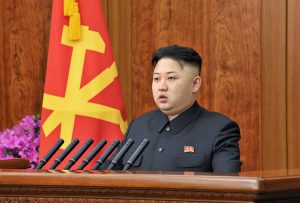
A remote psychological assessment of North Korean leader Kim Jong-un is currently in progress, using the third edition of the Millon Inventory of Diagnostic Criteria (MIDC), which yields 34 normal and maladaptive personality classifications congruent with Axis II of DSM-IV.
Preliminary analysis of the data suggests that Kim Jong-un’s personality is primarily an amalgam of the Accommodating and Outgoing patterns, a fitting descriptive label for which would be congenial–cooperative.
The core characteristics of congenial–cooperative leaders may be summarized as follows:
- Agreeable, acquiescent, and affiliation-motivated; tend to be inclusive, accommodating, and obliging in their relationships with others; characteristically gracious, neighborly, and benevolent, preÂferring to avoid conflict and seek harmony — occasionally at the expense of their own internal beliefs and values.
- Charming and socially gregarious, with a knack for focusing attention on themselves through dramatic or self-dramatizing action.
- Place a high premium on external approval, to the extent that in some respects they may value themselves more in terms of their relationships with others than for their own intrinsic qualities; by allying themselves with the virtues of others, they bolster themselves through a sense of shared competence.
- Tend to smooth over life’s problems, mainÂtaining an air of pleasantry and goodwill, with a corresponding tendency to disavow disturbing emotions and maintain a relatively uncritical, optimistic outlook on human events.
- Value service to others and are sympathetic to others’ needs, which at times may be self-defeating in the sense of relinquishing too much authority, failing to assert themselves sufficiently, delegating too much responsibility, or hesitation in taking the initiative when circumstances demand boldness or daring.
The personality profile raises the question of who is really in charge in North Korea; in short, the bellicose rhetoric emanating from the DPRK is inconsistent with Kim Jong-un’s psychological profile.
References
Immelman, A. (2003). Personality in Political Psychology. In I. B. Weiner (Series Ed.), T. Millon & M. J. Lerner (Vol. Eds.), Handbook of Psychology: Vol. 5. Personality and Social Psychology (pp. 599–625). Hoboken, NJ: Wiley.
Immelman, A. (2005). Political Psychology and Personality. In S. Strack (Ed.), Handbook of Personology and Psychopathology (pp. 198–225). Hoboken, NJ: Wiley.
Immelman, A. (2008). Millon Inventory of Diagnostic Criteria Manual (3rd ed.). Unit for the Study of Personality in Politics, College of St. Benedict and St. John’s University, St. Joseph and Collegeville, MN.
Immelman, A. (2012). Millon Inventory of Diagnostic Criteria (3rd ed.). Unit for the Study of Personality in Politics, College of St. Benedict and St. John’s University, St. Joseph and Collegeville, MN.
Immelman, A. (2012). Containing North Korea: The Psychological Profile of Kim Jong-Il. Paper presented at the 35th Annual Scientific Meeting of the International Society of Political Psychology, Chicago, July 6–9, 2012.
Millon, T., & Davis, R. D. (2000). Personality Disorders in Modern Life. New York: Wiley.
—————————————
Related: April 4, 2013
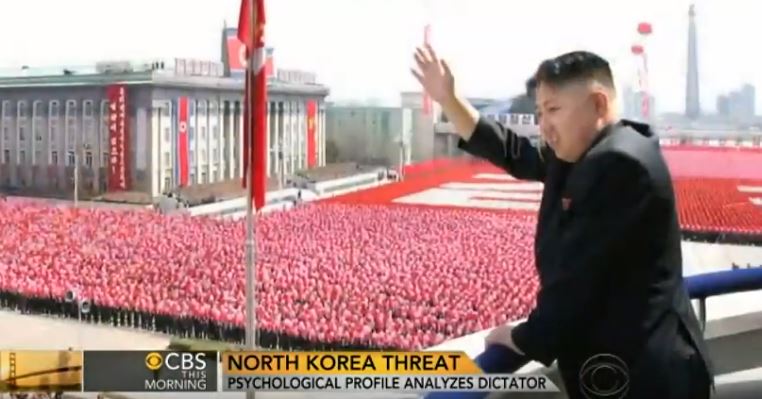
A psychological profile of Kim Jong Un (CBS News, April 4, 2013) — As the belligerent rhetoric from North Korea continues, U.S. Intelligence has put together a psychological profile of North Korea’s president Kim Jong Un. David Martin reports on the man behind the threats. (Video: 02:12)
————————————
Update: May 7, 2013

Kim Jong-un (Photo: Kyodo via Reuters)
How firmly Kim Jong-un is in control of North Korea is not fully known
Preliminary analysis of the data suggests that Kim Jong-un is not calling the shots, and therefore is either not fully in control of the leadership in North Korea or is permitting others to take the lead in military matters; the bellicose rhetoric emanating from the DPRK is inconsistent with Kim Jong-un’s personality pattern.
—————————————
Update: May 22, 2015
Who’s Really Running the ‘Kingdom of Kim’?
Professor Han S. Park, director of the University of Georgia’s Department of International Affairs, says the Party, not Kim Jong Un, controls North Korea; according to Park, experienced and knowledgeable Party leaders influence most decisions. CNN’s Will Ripley reports. (03:09)
Follow-up Study 1
The Personality Profile
of North Korean Supreme Leader Kim Jong Un
ê¹€ì •ì€
Meghan Keaveny, Franchesca Cromett, Cole Stang, Kristen Jacobs, Kara Fiedler, Grace Arrington, Abigail Granger, Meg McMahon, and Aubrey Immelman
Unit for the Study of Personality in Politics
April 27, 2017
In a 1965 World Politics article titled “The Dictator and Totalitarianism,†Princeton Sovietologist Robert Tucker wrote that totalitarian regimes serve as conduits for dictatorial psychology because of the weak structural constraints their political machinery impose on the leader. Considering the Democratic People’s Republic of Korea counts among the most totalitarian of contemporary regimes, one would think it would be a simple matter to assess the personal psychology of its supreme leader, Kim Jong-un.
Not so. It has proven extraordinarily difficult to find reliable information pertaining to Kim’s personal psychology. The first obstacle is the secrecy surrounding the Kim dynasty, exacerbated by the state-sponsored cult of personality and deification of the Kim family. Second, and equally problematic, is the tendency of news reports and media commentary to conflate regime behavior and Kim’s personal traits. Thus, characterizations of Kim as “erratic†or “unstable†tend to be spurious attributions of regime behavior to the person of Kim Jong-un.
The Unit for the Study of Personality in Politics’ first study of Kim Jong-un – completed in April 2013, a year after Kim assumed the mantle of Chairman of the Workers’ Party of Korea and Supreme Leader of the DPRK – found him to be generally congenial and cooperative, with no indication of remarkable aggressive tendencies or an unstable personality.
A follow-up study conducted four years later in spring 2017, in the wake of increasingly bellicose rhetoric and escalating military provocations on the part of the North Korean regime, specifically searched for evidence that could link this aggression to Kim’s personal attributes. Kim was found, at worst, to have only a moderate predisposition to aggressive behavior.
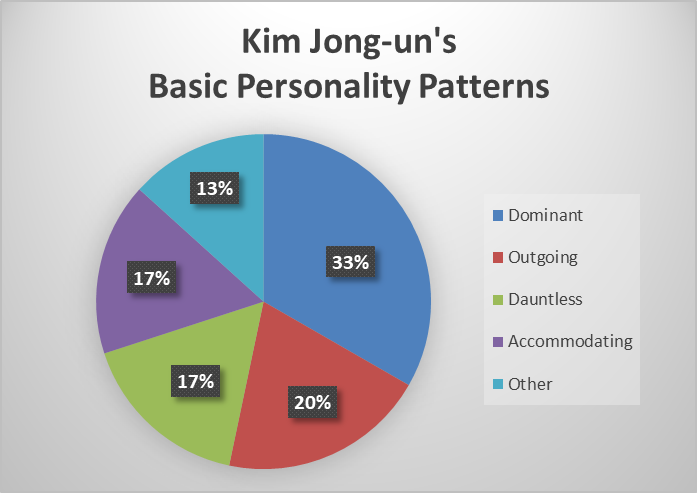
Specifically, Kim Jong-un’s score of 10 on MIDC scale 1A (Dominant) – a measure of aggressiveness – is modest compared with recent U.S. presidents (Donald Trump, 17; George W. Bush, 11; Barack Obama, 10; Bill Clinton, 7).
Moreover, Kim Jong-un’s score of 5 on MIDC scale 4 (Accommodating) – a measure of cooperativeness – is comparable to those of recent U.S. presidents (Barack Obama, 7; Bill Clinton, 5; George W. Bush, 4; Donald Trump, 0).
After close scrutiny of the data and careful examination of the empirical research results, it is concluded that a valid assessment of the military threat posed by North Korea with respect to the U.S. and its allies cannot be conducted without access to classified intelligence and collateral information from individuals personally acquainted with Kim Jong-un throughout his lifespan. Nonetheless, research efforts will continue through 2017, with updated findings scheduled for release early in 2018.

Social sciences librarian Diana Symons instructs USPP research assistants Meghan Keaveny (front left), Jacob Wankel, and Jim Hasselbrink in database research methods for a follow-up study of Kim Jong-un’s personal psychology as a basis for conducting an updated North Korea threat assessment, Aug. 4, 2017.

Franchesca Cromett, Meghan Keaveny, Meg McMahon, and Kristen Jacobs present “The Personality Profile of North Korean Supreme Leader Kim Jong Un†at the College of St. Benedict, St. Joseph, Minn., April 27, 2017.
—————————————
Update: April 8, 2018
The Personality Profile of North Korean Supreme Leader Kim Jong Un
Working paper by Aubrey Immelman, Unit for the Study of Personality in Politics, St. John’s University and the College of St. Benedict, Collegeville and St. Joseph, Minn., April 1, 2018. Abstract and full text available for download at Digital Commons: https://digitalcommons.csbsju.edu/psychology_pubs/119/
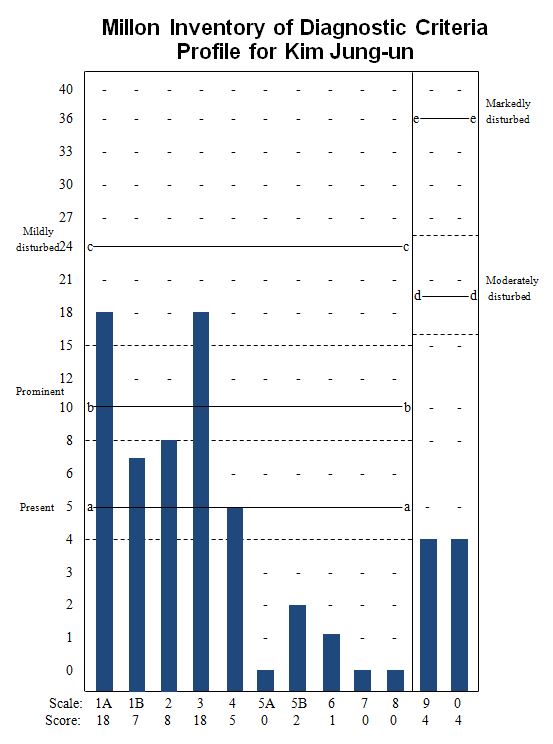

Follow-up Study 2
The Personality Profile
of North Korea’s Kim Jong Un
ê¹€ì •ì€
Katlin Rice, Austen Luetmer, Suntina Spehar, Hillary Rethlake, Lucas Vetsch, Amanda Olson, Mariah Ogden-Kellington, and Aubrey Immelman
Unit for the Study of Personality in Politics
April 26, 2018
Abstract
A remote psychological assessment of North Korean leader Kim Jong-un was conducted from 2017 to 2018. Psychodiagnostically relevant data regarding Kim were extracted from open-source media reports and synthesized into a personality profile using the Millon Inventory of Diagnostic Criteria (MIDC), which yields 34 normal and maladaptive personality classifications congruent with DSM–III–R, DSM–IV, and DSM–5.
The personality profile yielded by the MIDC was analyzed in accordance with interpretive guidelines provided in the MIDC and Millon Index of Personality Styles manuals. Kim’s primary personality patterns were found to be Outgoing/gregarious and Dominant/controlling, supplemented by secondary Ambitious/confident, Dauntless/adventurous, and Accommodating/cooperative features. Given his Outgoing–Dominant primary personality composite, Kim may be classified as a high-dominance extravert.
Outgoing individuals are dramatic attention‑getters who thrive on being the center of social events, go out of their way to be popular with others, and are confident in their social skills; they may have an impulsive tendency and be prone to boredom. Dominant individuals enjoy the power to direct others and to evoke obedience and respect; they can be tough and unsentimental and often make effective leaders. Ambitious individuals are bold, competitive, and self-assured; they easily assume leadership roles, expect others to recognize their special qualities, and may act as though entitled. Dauntless individuals tend to flout tradition, conventional standards, and cultural mores, dislike following routine, and may act impulsively and recklessly; they are resistant to coercion and may exhibit a strong need for autonomy and self-determination. Accommodating individuals are notably cordial, cooperative, and amicable; they are willing to adapt their preferences to be compatible with those of others, to reconcile differences to achieve peaceable solutions, and to concede or compromise when necessary.
Kim Jong-un’s major personality-based leadership strength is a distinctly outgoing tendency, supplemented by an accommodating inclination, a fitting descriptive label for which would be congenial–cooperative. Leaders matching this profile can be expected to be jovial, socially gregarious, agreeable, accommodating, and obliging in their relationships with others; they are characteristically gracious, neighborly, and benevolent, preÂferring to avoid conflict and seek harmony with others.
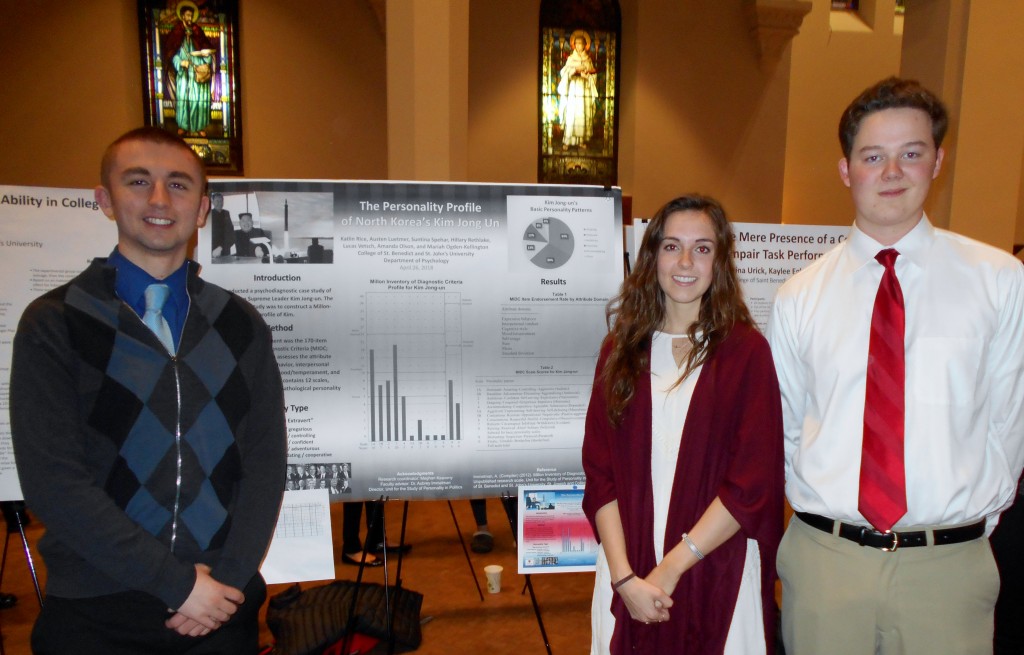
Lucas Vetsch, Amanda Olson, and Austen Luetmer present “The Personality Profile of North Korea’s Kim Jong Un” at St. John’s University, Collegeville, Minn., April 26, 2018. According to the study, “Kim Jong-un’s major personality-based leadership strength is a distinctly outgoing tendency, supplemented by an accommodating inclination, a fitting descriptive label for which would be congenial–cooperative. Leaders matching this profile can be expected to be jovial, socially gregarious, agreeable, accommodating, and obliging in their relationships with others; they are characteristically gracious, neighborly, and benevolent, preÂferring to avoid conflict and seek harmony with others.”
Follow-up Study 3
The Personality Profile
of North Korean Supreme Leader Kim Jong Un
ê¹€ì •ì€
Aubrey Immelman
Unit for the Study of Personality in Politics
Poster presented at the 41st Annual Scientific Meeting
of the International Society of Political Psychology
San Antonio, TX
July 4-7, 2018
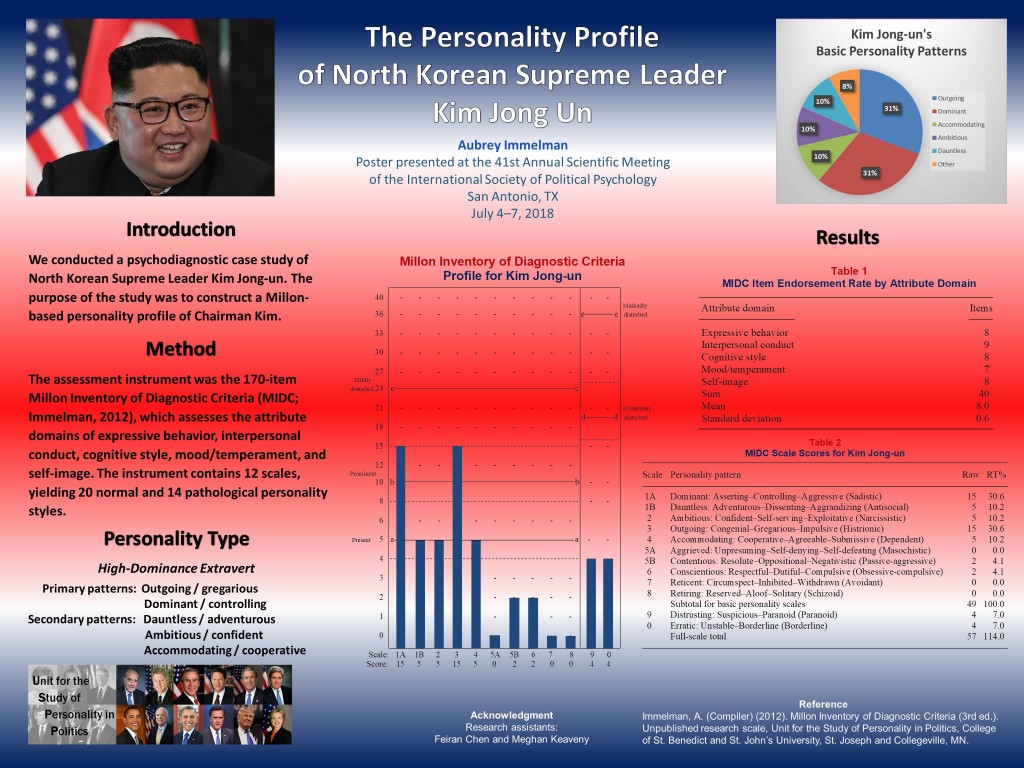
Click on image for larger view
Abstract
A remote psychological assessment of North Korean leader Kim Jong-un was conducted from 2013 to 2018. Psychodiagnostically relevant data regarding Kim were extracted from open-source media reports and synthesized into a personality profile using the Millon Inventory of Diagnostic Criteria (MIDC), which yields 34 normal and maladaptive personality classifications congruent with DSM–III–R, DSM–IV, and DSM–5.
The personality profile yielded by the MIDC was analyzed in accordance with interpretive guidelines provided in the MIDC and Millon Index of Personality Styles manuals. Kim’s primary personality patterns were found to be Outgoing/gregarious and Dominant/controlling, supplemented by secondary Dauntless/adventurous, Ambitious/confident, and Accommodating/cooperative features.
Outgoing individuals are dramatic attention‑getters who thrive on being the center of social events, go out of their way to be popular with others, and are confident in their social skills; they may have an impulsive tendency and be prone to boredom. Dominant individuals enjoy the power to direct others and to evoke obedience and respect; they can be tough and unsentimental and often make effective leaders. Dauntless individuals tend to flout tradition, conventional standards, and cultural mores, dislike following routine, and may act impulsively and recklessly; they are resistant to coercion and may exhibit a strong need for autonomy and self-determination. Ambitious individuals are bold, competitive, and self-assured; they easily assume leadership roles, expect others to recognize their special qualities, and may act as though entitled. Accommodating individuals are cordial, cooperative, and amicable; they are polite, respectful, and agreeable, willing to adapt their preferences to reconcile differences, and to concede or compromise when necessary to achieve peaceable solutions.
It may be inferred on the basis of his primary Outgoing personality pattern, infused with secondary Accommodating qualities, that in the absence of strong situational constraints Kim will be inclined to congenial–cooperative behavior in negotiations; a generalized expectancy for leaders with this particular psychological predisposition is to behave in a manner that is gracious, jovial, socially gregarious, agreeable, accommodating, and obliging in relating to others, with an underlying attitude of benevolence and neighborliness and a preÂference for avoiding conflict and seeking harmony with others.
Framed in terms of heuristic leadership models in political psychology, Kim appears to be temperamentally active-positive, with an active-independent orientation to foreign affairs and high-dominance extraversion as his preferred operating style in the international system.
PowerPoint presentation: Kim Jong Un Psychological Profile
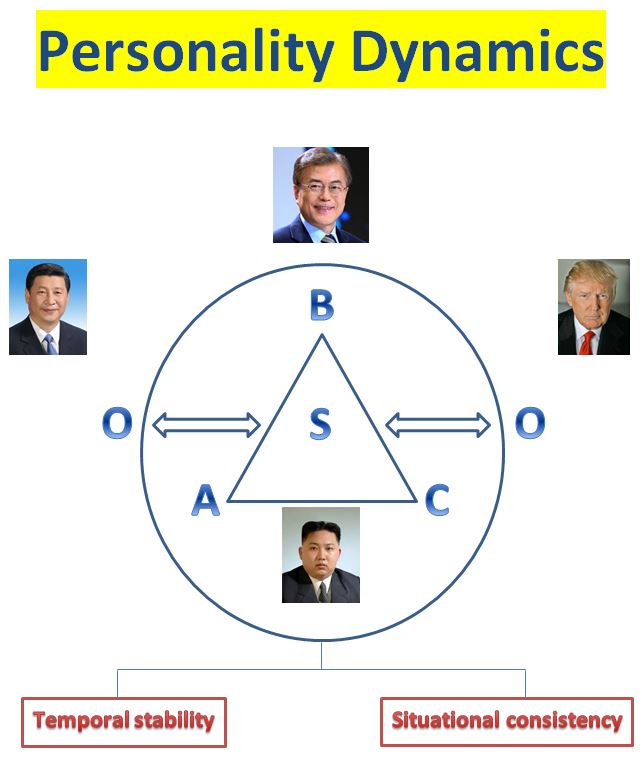
Compilations in the Public Domain

Kyodo News via Associated Press
Kim Jong-un (News about Kim Jong-un, including commentary and archival articles published in The New York Times)
Kim Jong-un (Wikipedia)
North Korea’s Nuclear Threats (The New York Times)
Timeline of Earlier Reports in the Media
![]()
June 2, 2009
North Korea: Kim’s youngest son named successor
—————————————————————————————
North Korea Taps 26-Year-Old Son As Successor

South Korean protesters with portraits of North Korean Kim Jong Il, right, and his alleged third son Kim Jong Un, shout a slogan during a rally against North Korea’s recent military policy in Seoul, on March 9, 2009. (Photo credit: Ahn Young-joon / AP file)
![]()
June 2, 2009
SEOUL, South Korea — One photo shows a chubby-cheeked boy with an impish grin. Former classmates at a Swiss boarding school describe a shy student who loved basketball and Jean-Claude Van Damme. Recent reports describe him as overweight and a heavy drinker.
Now 26, Kim Jong Un has reportedly been tapped to become the next leader of nuclear-armed North Korea. …
——————————————————
Recollections of teachers and former students at a state school in Switzerland may offer a glimpse of the young man some say is destined to lead North Korea.
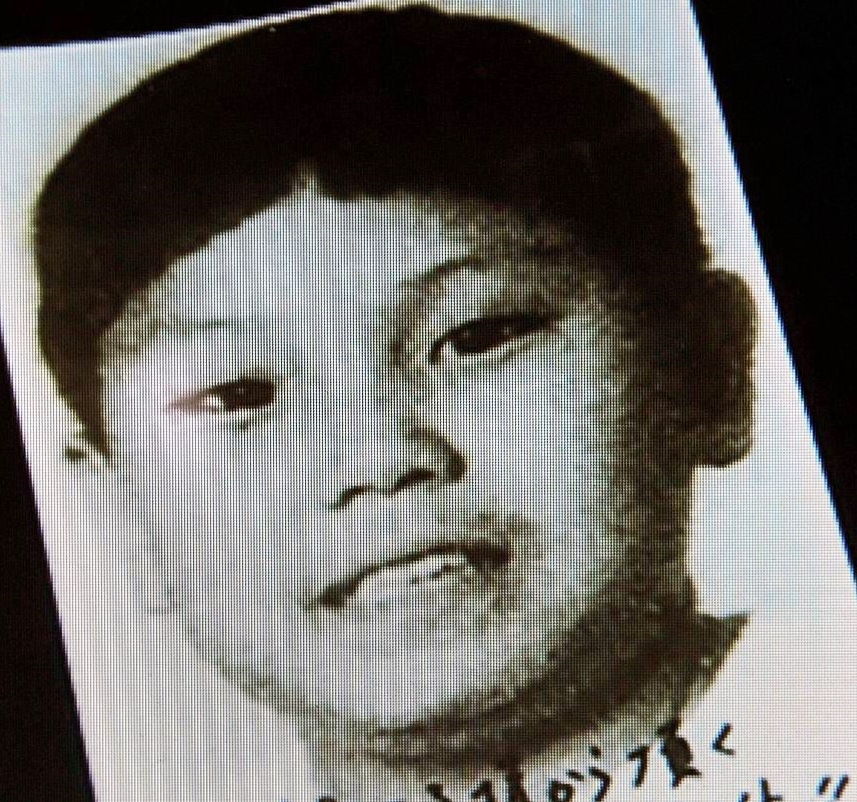
A boy identified by South Korean TV station KBS as Kim Jong Un, the third son of North Korean leader Kim Jong Il, is seen in this image. Kenji Fujimoto, who claims to have worked as a cook for the family for 13 years, says Kim Jong Un was aged 11 when the photo was taken. (Photo credit: Kenji Fujimoto / Reuters)
By Andrew Higgins
![]()
July 16, 2009
LIEBEFELD, Switzerland — In August 1998, as famine reached a terrible climax in North Korea, the destitute Asian nation enrolled a shy teenager in a Swiss state school. He arrived with a fake name, a collection of genuine, top-of-the-line Nike sneakers and a passion for American basketball.
“We only dreamed about having such shoes. He was wearing them,” recalled Nikola Kovacevic, a former schoolmate of the curiously well-heeled North Korean. Each pair, estimates Kovacevic, cost more than $200 — at least four times the average monthly salary in the Democratic People’s Republic of Korea, where perhaps 1 million people died as a result of food shortages in the mid- and late 1990s.
Today, the student — who vanished from this sleepy Swiss district as mysteriously as he appeared — is a key figure in a puzzle that U.S. and Asian intelligence services are scrambling to solve: Who will lead nuclear-armed North Korea — and where to — once its gravely ill leader, Kim Jong Il, passes from the scene?
The answer is of vital importance to Washington, which has about 25,000 troops in South Korea, on guard against any resumption of a conflict frozen — but never formally ended — by a Korean War armistice accord in 1953. Who rules North Korea will decide whether Seoul, Tokyo and perhaps even Hawaii risk attack from a nation that has tested two nuclear devices, the most recent in May, and built up an arsenal of missiles and long-range artillery. The Pentagon has sent missile-defense systems to Hawaii just in case. North Korea marked July 4 this year by test-firing seven more rockets.
North Korea shrouds the biographies of its rulers and their offspring in a fog of fiction and silence. “It is pretty amazing how very little real information we have,” said Victor Cha, who served as a Korea expert on the National Security Council in the Bush administration.
A rare insight into this sealed world is offered by Swiss recollections of the young North Korean who, from 1998 until late 2000, lived here in Liebefeld at No. 10 Kirchstrasse, a sedate suburban street with two pizza joints, a Credit Suisse bank and a Coop supermarket. He was around 17 when he abruptly left in the middle of the school year, apparently to return to Pyongyang.
There are many signs that he may now be the next leader of North Korea — 26-year-old Kim Jong Un, the third and youngest son of Kim Jong Il.
Known as “Pak Un” to his teachers at Liebefeld-Steinhözli Schule, a German-speaking state school, he was registered with Swiss authorities as the son of an employee at North Korea’s embassy in the nearby city of Bern, Switzerland’s capital, according to Ueli Studer, director of education in the local administration.
Throughout Pak Un’s time in Liebefeld, however, neither friends nor teachers ever met the parents. “I never saw his father or mother,” said the school’s principal, Peter Burri, recalling how they repeatedly failed to show up for parents’ night. Attending in their place, Burri said, were assorted North Koreans who apologized for the parents’ absence and said this was due to their inability to speak German.
A more likely reason: The boy’s father didn’t work in Bern at the embassy but was more than 5,000 miles away in Pyongyang.
Maria Micaelo, the mother of one of Pak Un’s closest school friends, said the North Korean teenager once confided to her son, Joao, that his father was the leader of North Korea. She recalled that she dismissed the claim as a fanciful teenage boast, but had second thoughts when her son saw pictures of Kim Jong Il on television and told her that he’d seen the same man in a photograph with Pak Un. Joao Micaelo, now a cook in Vienna, did not respond to repeated e-mail messages seeking comment.
Kongdan Oh Hassig, an expert on North Korea at the Alexandria-based Institute for Defense Analyses, which does research for the Pentagon, says Pak Un certainly appears to be Kim Jong Il’s third son, Kim Jong Un, adding that members of North Korea’s elite usually use bogus names outside their homeland. Pak is a very common Korean surname akin to Smith.
When reports of a Pyongyang succession plan began to leak out of North Korea this year, heir apparent Kim Jong Un was widely reported to have attended the International School of Berne, a private, English-speaking establishment near the North Korean Embassy in the Swiss capital.
But, North Korea watchers say, that student — who went by the name “Pak Chol” — was most likely Kim Jong Un’s older brother, Kim Jong Chol. Both were born to Kim Jong Il’s third wife, a former dancer who died in 2004. The North Korean leader has another son, his oldest, by another wife. He also has four daughters. The oldest son, Kim Jong Nam, also studied for a time in Switzerland under an alias, as well as in the Soviet Union. …
Question of Culture’
The Swiss education of North Korea’s apparent future leader raises a tantalizing question: Did it open his horizons beyond the narrow, xenophobic worldview of his homeland, where schools bombard pupils with the evils of “U.S. imperialism” and instill unquestioning obedience to a highly centralized state headed by a leader-for-life? This is in stark contrast to Switzerland, a democratic federal state in which power is widely diffused, where all laws can be challenged by citizens through referendum, and where the presidency is a rotating position that changes every year.
“There is a big difference between attending a school in a free country and a school where everyone has to salute,” said Studer, the local education director. Schooling, he added, is a “question of culture,” and a North Korean schooled in Liebefeld “will take something away that will have an effect on his life.” Pak Un, along with fellow students, had three classes a week on Swiss history from 1291 and the evolution of the country’s modern system of governance known as “direct democracy,” as well as current events, which in 2000 included the U.S. election campaign.
The North Korean Embassy in Bern, housed in an elegant villa festooned with geraniums in the capital’s most expensive neighborhood, declined to comment. Some analysts in South Korea have expressed uncertainty about whether Kim Jong Un has definitely been selected as successor, noting that no official announcement has yet been made by Pyongyang.
A propaganda display on the embassy’s ivy-covered wall obliquely addresses the issue of succession, stressing the reinvigorating vitality of youth, a frequent theme of North Korean propaganda in recent months as the regime prepares for a transfer of power. Featuring photographs of young soldiers, young athletes and Youth League zealots, it shows Kim Jong Il as he “hands over the torch of revolution to young vanguards of Juche,” the regime’s idiosyncratic state ideology.
Since North Korea’s founding in 1945, power has passed exclusively from father to son. A hereditary dynasty, it mixes communist cant with Confucian emphasis on the primacy of family ties. Its founder, Kim Il Sung, known as the Great Leader, fabricated a patriotic lineage stretching back to the mid-19th century. After his death in 1994, power passed to his eldest son, the Dear Leader Kim Jong Il, who, according to his own falsified biography, was born on a Mount Paektu, a sacred mountain. He was really born in the Soviet Union, where he was known as Yuri.
With Kim Jong Il, 67, now ailing, North Korea is preparing to hand the baton to the third generation — and gearing up for a new round of hagiography and mythmaking. …
Last month, according to Open Radio for North Korea, a Seoul-based group with extensive contacts in North Korea, Pyongyang began holding lectures for selected audiences to trumpet the “greatness” of Kim Jong Un, the heir apparent. He was celebrated as a “genius of literary arts” and tireless patriot who “is working without sleep or rest” to promote North Korea as a nuclear superpower, according to the organization’s account of the sessions. Among his purported feats: He so inspired North Korea’s national soccer squad that it recently qualified for the World Cup finals, the first time the team has done so since 1966.
A confidential report prepared in May by the Open Source Center, a U.S. agency that monitors foreign media outlets, said North Korea began to prepare the way for a hereditary successor to Kim Jong Il in 2001 with an essay in a party newspaper titled “A Brilliant Succession.” It didn’t name anyone but defined father-son succession as a “pure” tradition, and warned that any revolution that doesn’t follow tradition is “dead.”
This subtle campaign accelerated sharply, according to the report, after Kim Jong Il fell seriously ill, possibly suffering a stroke, last August and vanished for months. U.S. analysts, seeking clues in mountains of North Korean propaganda, noted increasingly frequent mentions of the importance of “bloodlines” and detected veiled endorsements of Kim Jong Un.
Kim Jong Il’s eldest son, Jong Nam, was for a time viewed as a likely heir but apparently bungled his chances in 2001 by trying to sneak into Japan under a fake Chinese name on a bogus Dominican Republic passport. He told Japanese immigration officials he wanted to visit Tokyo Disneyland. Interviewed briefly last month in the Chinese gambling enclave of Macau by Japanese television, Jong Nam said he had heard reports that his younger brother, Jong Un, had been chosen as successor but couldn’t comment because that “is a very sensitive question.”
Focused and Competitive
Kim Jong Un has not been seen in public since his apparent time in Switzerland. Neither his name nor his photograph has ever appeared in North Korean media. After leaving Europe, he is reported to have attended Pyongyang’s Kim Il Sung Military University, an officer training school, but virtually nothing else is known about him.
A senior U.S. official says he appears to have “the same interests as most 26-year-olds,” noting that these do not generally involve nuclear strategy.
If Liebefeld’s former student Pak Un is indeed Kim Jong Un, the memories of his former friends and teachers here offer a sketch of his character. He first started school after the summer holidays in 1998, a time when it looked as if North Korea might soon collapse. At about the same time, Kim Jong Il launched a secret program to produce highly enriched uranium for a nuclear bomb.
During his first few months in Liebefeld, Pak Un attended a remedial language course for foreign students with poor German. A swift learner, he soon switched to a regular class, said Studer, the education official, who described the boy as “well-integrated, diligent and ambitious.” Friends recalled that Pak Un spoke fluent, if sometimes ungrammatical, German but struggled with the Swiss dialect. He also knew English.
A video of a school music class he attended shows a lithe, intense-looking Asian boy wearing black sweat pants, Nike Air Jordan shoes and a long-sleeved black sports shirt. He sways uncomfortably while classmates pound African drums and beat tambourines. Though generally quiet in class and sometimes awkward, particularly around girls, Pak Un showed a different personality on the basketball court, former friends recalled. He fell in with a group of mostly immigrant kids who shared his love of the National Basketball Association. Kovacevic, who shot hoops with the North Korean most days, said Pak Un was a fiercely competitive player.
“He was very explosive. He could make things happen. He was the playmaker,” said Kovacevic, who now works as a tech specialist in the Swiss army. “If I wasn’t sure I could make a shot, I always knew he could.”
Marco Imhof, another Swiss basketball buddy, said the Korean was tough and fast, good at both shooting and dribbling. “He hated to lose. Winning was very important,” recalled Imhof. Pak Un also liked action films featuring hand-to-hand fighting, particularly those starring the Hong Kong kung fu star Jackie Chan, and played combat games on a Sony PlayStation.
This picture of a focused, competitive young man matches what until now has been the only firsthand account of Kim Jong Un. That was provided by a Japanese sushi chef who claims to have worked in Pyongyang as a cook for the Kim family. The chef, who wrote a book on his experiences in Japanese under the pseudonym Kenji Fujimoto, described the boy as strong-willed, proud and “boss-like.”
During his time in Liebefeld, friends remembered, Pak Un showed scant interest in politics and never vented publicly against Americans. Instead, he worshiped American basketball stars. He spent hours doing meticulous pencil drawings of Chicago Bulls superstar Michael Jordan.
At his spacious apartment on Kirchstrasse, said one friend who visited, Pak Un had a room filled with American basketball paraphernalia. He proudly showed off photographs of himself standing with Toni Kukoc of the Chicago Bulls and Kobe Bryant of the Los Angeles Lakers. It is unclear where the pictures were taken. On at least one occasion, a car from the North Korean Embassy drove Pak Un to Paris to watch an NBA exhibition game.
With no parents in sight, Pak Un was watched over and waited on by North Koreans who appeared to combine the duties of servants, guardians and guards. A pair of Korean women, says Imhof, often observed him playing basketball and sometimes videotaped the action. A Korean-speaking man frequently hovered nearby. “It was a bit strange,” Imhof said. But he figured this was just “a Korean thing.”
Pak Un’s ultimate guardian in Switzerland was Ri Tcheul, North Korea’s veteran ambassador in Bern. Ri has served in the Swiss capital for 21 years, making him the city’s longest-serving foreign envoy. Over the years, he has turned the embassy into the nerve center for Pyongyang’s sometimes furtive contacts with businessmen, bankers, officials and aid workers from across Europe.
Studer, the local education official, said school authorities never had reason to question whether Pak Un really was the son of an embassy employee. Now that he’s gone, he added, “there is no need to go into the matter.”
Pak Un’s former friends are more curious and say they’d like to know the real identity of the teenager they used to hang out with. They last saw him in 2000, when he suddenly vanished. He left no address and didn’t tell anyone where he was going.
“We thought he was ill or something and would soon be back. He never came to school again. He totally disappeared,” said Kovacevic, his former friend. He and others asked teachers what had happened. They had no idea either. “We were just playing basketball — now he is going to be a dictator,” said Kovacevic. “I hope he is a good leader, but dictators are usually not that good.”
—————————————————————————————
North Korea Releases Photo of Kim’s Likely Heir
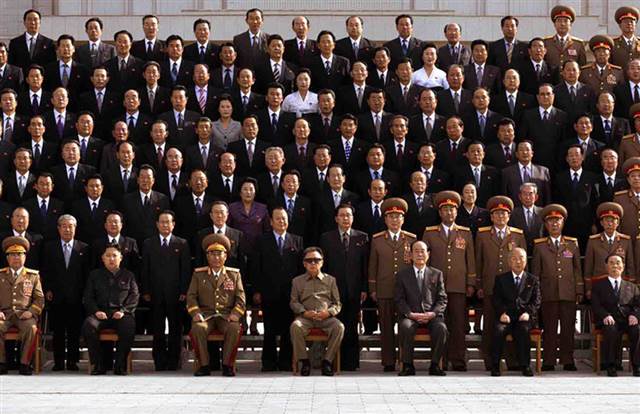
The front page of North Korea’s Rodong Shinmun newspaper on Thursday, Sept. 30, 2010 shows a group photo of senior North Korean officials, including Kim Jong Un. The newspaper identified Kim Jong Un as being second from left in the front row. (Photo credit: The Associated Press)
The Associated Press and Reuters via MSNBC.com
September 30, 2010
North Korea on Thursday released what is believed the first official image of leader Kim Jong Il’s youngest son and heir apparent. …
The photo’s release comes after the younger Kim earlier this week was handed top military and party posts at a Workers’ Party conference.
The ascension of Kim Jong Un to a prominent ruling party post put him well on the path to succeed the supreme leader at the helm of nuclear-armed North Korea and carry the family dynasty into a third generation.
Rising with him were the ailing Kim Jong Il’s sister and her husband, creating a powerful triumvirate ready to take over the family dynasty that has ruled North Korea since its founding after World War Two.
Kim’s Swiss-educated, youngest son was made a four-star general in his first mention in North Korea’s state media on Tuesday. Early Wednesday, the communist nation announced that Kim Jong Un was appointed to the Workers’ Party Central Committee.
After months of speculation, the state KCNA news agency announced on Wednesday that the untested Kim Jong Un had been made second in command to his father at the ruling party’s powerful Central Military Commission.
“It is another step toward a new power structure which will consist of Kim Jong Un, a young and inexperienced dictator, and two people — his aunt and her husband — who will be making all real political decisions while mentoring the young leader,” said Andrei Lankov, a North Korea expert at Kookmin University. “A figurehead and a couple of powerful regents, if you like.”
Kim Jong Il’s sister Kim Kyong Hui, 64, retained her position as a department director on the Central Committee and gained a new post as a member of the Central Committee’s Political Bureau — the country’s second-highest political body. She has risen sharply in prominence in recent months and has been seen frequently at her brother’s side.
Her husband was also awarded new political titles. Jang Song Thaek was named an alternate Political Bureau member, KCNA said. …
Kim Jong Un is believed to be only 27 and until this week held no known political or military positions. However, he was always his father’s favorite, and the most like him in looks and ambition, the family’s former chef wrote in “I Was Kim Jong Il’s Cook” under the pen name Kenji Fujimoto. …
Experts are skeptical of any new dawn.
“Even with a new leader, North Korea is not likely to give up its nuclear ambitions,” said Anh Yinhay of Korea University. …
————————————————————————————————————————
Pyongyang Celebrates 65th Anniversary of Ruling Workers’ Party
Kim Jong Un anointed next leader of North Korea
![]() Video
Video
North Korea’s next ruler raises red flags for West (NBC Nightly News, Oct. 10, 2010) — Kim Jong Un, a young man with little experience in global negotiation, will soon control the fifth largest army in the world. NBC’s Angus Walker reports. (01:27)
By Jean H. Lee
![]()
October 11, 2010
PYONGYANG, North Korea — The party in Pyongyang stretched into Monday as North Koreans took the day off to celebrate a major political anniversary and to revel in the unveiling of leader Kim Jong Il’s heir-apparent, son Kim Jong Un. …
Until two weeks ago, Kim Jong Un’s anointment as his father’s successor was little more than rumor and speculation outside North Korea.
But his promotion to four-star general late last month, followed by his appointment to key political posts within the Workers’ Party, confirmed what had been suspected for more than a year: that he is being groomed to succeed his 68-year-old father and to take the Kim family dynasty into a third generation.
Believed to be 26, the untested son would face a mountain of challenges if he were to take over soon as leader, including tensions with regional powers over Pyongyang’s nuclear weapons program and a faltering economy further strained by sanctions imposed by the U.S. and United Nations. …
[North Koreans] seemed ready to embrace the son already familiarly known as the Young General. Though he has been a figure of mystery outside North Korea, adulation of the heir-apparent is already well in place inside the country. …
———————————————————————————
North Korea’s ‘Illustrious’ Son Has Busy Year
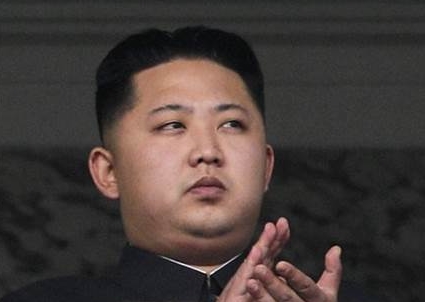
North Korea leader Kim Jong Il’s son Kim Jong Un attends a military parade marking the 65th anniversary of the ruling Workers’ Party in Pyongyang, North Korea, on Oct. 10, 2010. (Photo credit: Vincent Yu / AP)
By Jean H. Lee
![]()
October 10, 2011
PYONGYANG, North Korea — The Illustrious General has had a busy year.
Since making his international debut a year ago Monday, Kim Jong Un has been serving as military strategist, political statesman and trusted deputy to his father, leader Kim Jong Il.
The newly minted four-star general, believed in his late 20s, is widely credited at home with orchestrating a deadly artillery attack on a front-line South Korean island that nearly brought the foes to the brink of another war. He appears regularly with his father at marquee events and accompanies him on inspection trips to farms and factories — visits now commemorated with plaques bearing his name.
Officials even say Jong Un, who was on hand for a recent state visit by Laos’ president, has been entrusted with full leadership of the country while his father has made extended trips to China and Russia over the last year.
At least that’s the official portrait emerging of the young man who in just one year has cemented his status as North Korea’s next leader. …
—————————————————————————————————————
—————————————————————————————————————
Kim Jong Un vowed ‘real war’ if rocket was shot down (AP, Reuters, Jan. 8, 2012) — North Korea’s young leader vowed in 2009 to wage war if the country’s enemies shot down a rocket, footage aired on state television showed Sunday in the first official word of his role in military operations before his father’s death. The documentary … was aimed at showing that he was in charge of the armed forces long before his father, former leader Kim Jong Il, died of a heart attack last month. …He has pledged to uphold Kim Jong Il’s “military first” policy. … Full report
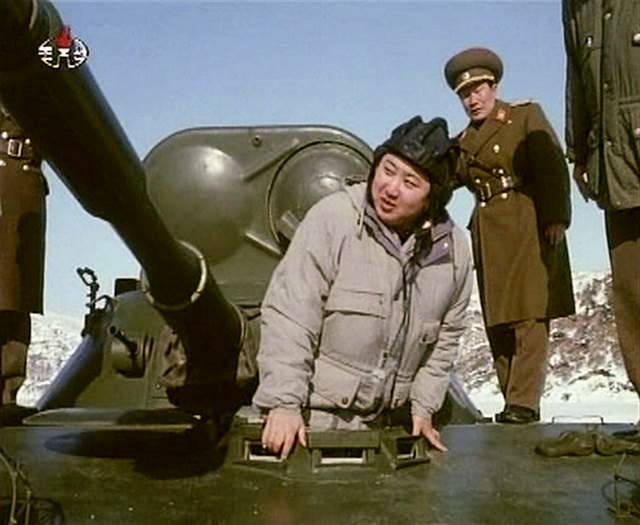
Kim Jong Un inspects an armored vehicle in this undated still image taken from video released by North Korean state TV KRT on Sunday, Jan. 8, 2012. (Photo credit: KRT via Reuters)
———————————————————————————————————
Report: Kim Jong Un Won’t ‘Last Long,’ Half Brother Says
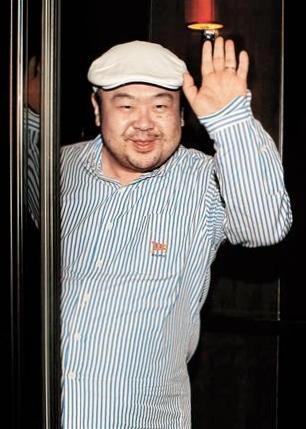
Kim Jong Nam, the eldest son of late North Korean leader Kim Jong Il, waves after an interview in Macau in June 2010. (Photo: Joongang Sunday / AFP — Getty Images)
The Associated Press via MSNBC.com
January 17, 2012
PYONGYANG, North Korea — Kim Jong Il’s eldest son has predicted that North Korea’s regime will “not last long” under the rule of his half brother, a newspaper reported Tuesday.
Citing e-mails exchanged between Kim Jong Nam and a Japanese journalist, South Korea’s Chosun Ilbo newspaper said that the dictator’s son described the country’s dynastic succession as “a joke to the outside world.”
Kim Jong Nam also predicted that his half brother Kim Jong Un would be “just a nominal figure,” adding: “The members of the power elite will be the ones in actual power.”
Kim Jong Un was vaulted into the leadership role with the death of his father, Kim Jong Il, in December. He had made his public debut as anointed successor only 15 months earlier.
His half brother suggested that North Korea’s new leader, who is believed to be aged 27, faced many challenges.
“Without reforms, North Korea will collapse, and when such changes take place, the regime will collapse,” the newspaper quoted Kim Jong Nam as saying. “The Kim Jong Un regime will not last long.” …
Among Kim Jong Il’s three sons, Kim Jong Un is seen as most like his father in manner and personality.
Kim Jong Nam is aged about 40 and is known for his playboy lifestyle and love of casinos. He is believed to have fallen out of favor with his father after being caught trying to enter Japan on a fake passport in 2001 saying he wanted to visit Disney’s Tokyo resort. Kim Jong Nam has lived in China in recent years.
“Because I was educated in the West, I was able to enjoy freedom from early age, and I still love being free,” Kim Jong Nam reportedly told the Japanese journalist. “The reason I visit Macau so often is because it’s the most free and liberal place near China, where my family lives.”
According to Chosun Ilbo, Kim Jong Nam said his half brother had traveled to Japan in the past using a “fake Brazilian passport.”
Chosun Ilbo said Yoji Komi, a former Seoul correspondent for Tokyo Shimbun newspaper, exchanged almost 100 emails with Kim Jong Nam between 2004 and December. They also spoke on at least two occasions. …
————————————————
Update: February 18, 2017
North Korean Man Arrested in Kim Jong Nam’s Death

Photo of Kim Jong-nam slumped in a chair in Kuala Lumpur International Airport published by Malaysia’s New Straits Times, reportedly showing the last moments of Kim Jong-nam’s life before he died after apparently being poisoned.
By Kathy Quiano
![]()
February 18, 2017
Authorities have arrested a fourth suspect in the mysterious death of the half brother of North Korea’s leader.
North Korean Ri Jong Chol was arrested Friday in Selangor, Malaysia. He is one of four people detained in the death of Kim Jong Nam, the estranged half brother of North Korean leader Kim Jong Un. …
The victim was on his way to catch a flight Monday morning to see his family in Macau when he died. Police believe he was sprayed with poison as he waited to board the flight at Kuala Lumpur International Airport in Malaysia.
In addition to the North Korean man, an Indonesian woman, a Malaysian man and another woman carrying Vietnamese identification have been arrested.
The Indonesian woman, identified as Siti Aishah, thought she was participating in a television prank show when she squirted liquid in the victim’s face, Indonesian police said. …
——————————————————————————————————————————
North Korean leader Kim Jong-Un poses with Wang Jiarui, head of the International Liaison Department of China’s Communist Party, and other Chinese officials in Pyongyang August 2, 2012 in this picture released by North Korea’s official KCNA news agency. (Photo credit: Reuters / KCNA)
Kim Jong Un promises ‘happy and civilized’ North Korea ( Reuters, Aug. 3, 2012) — North Korea’s new young leader has told chief backer China that his priority is to develop the decaying economy and improve living standards in one of the world’s poorest states, the latest sign that he may be planning economic reforms. Kim Jong Un, who took over the family dictatorship last December, has presented a sharply contrasting image to his austere father. He was shown most recently in public at a Pyongyang theme park with his young wife on his arm and riding a roller coaster in the company of a man reported to be a British diplomat. … Full story
—————————————————————————————
Kerry Dismissive of Rodman’s North Korea Visit
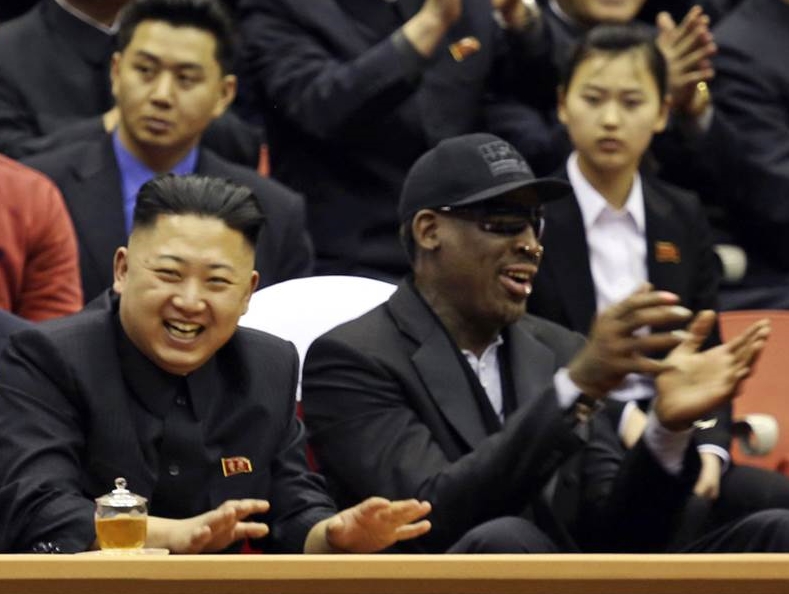
North Korean leader Kim Jong Un and former NBA star Dennis Rodman watch a basketball game in Pyongyang on Feb. 28, 2013 in this image released by North Korea’s official news agency. (Photo: KCNA)
By Erin McClam
NBC News
March 5, 2013
Secretary of State John Kerry [link to psychological profile added] took a shot Tuesday at eccentric former NBA star Dennis Rodman’s controversial visit to North Korea. …
Rodman visited North Korea last week and met with leader Kim Jong Un, pronouncing him an “awesome guy.†In Pyongyang, on his way out of the country, the lip-studded basketball player said of Kim: “Guess what? I love him.†…
——————————————————————————————————————————
North Korea Threats Predictable but Kim Jong Un Is Not, Analysts Say
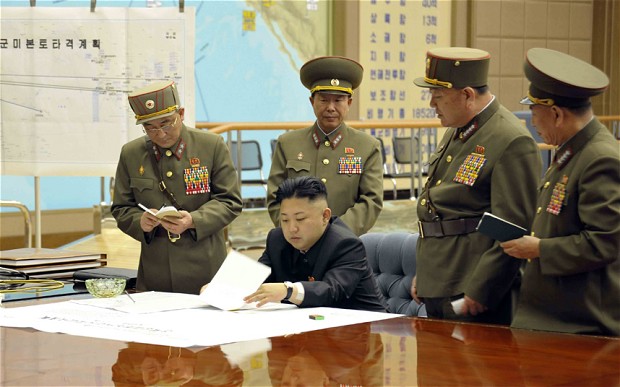
North Korean leader Kim Jong Un at a meeting with his generals where he ordered strategic rocket forces to be on standby to strike U.S. and South Korean targets, March 29, 2013 at an undisclosed location. [Note: The map against the wall appears to show the West coast of the United States, with the text reading ë¯¸ë³¸í† íƒ€ê²©ê³„íš (“U.S. Mainland Strike Plan”).] (Photo: KCNA via EPA)
NBC News
March 29, 2013
Is Kim Jong Un crazy — or crazy like a fox?
Analysts said Friday there’s a familiar method to the madness coming out of North Korea, where the rookie supreme leader has put rockets on standby, threatened to “settle accounts” with the U.S., and posed near a chart that appeared to map missile strikes on American cities. On Saturday, North Korea said it had entered a “state of war” against South Korea, according to a statement reported by the north’s official news agency, KCNA.
Kim Jong Un’s father and grandfather were also serial saber-rattlers when they headed the secretive regime, and experts said there are clear strategic reasons why the world’s youngest head of state is ramping up the rhetoric now, after little more than a year in power.
But if the bluster is predictable, the results may not be.
North Korea has enhanced its nuclear capabilities and Kim Jong Un has something to prove to his people and the world. Some outside observers are warning that a misstep, or overstep, by Pyongyang could bring north[east] Asia to the brink of war.
“I think there is always room for miscalculation and things spiraling out of control,” said Sung-Youn Lee, professor at the Fletcher School of Law and Diplomacy at Tufts University. “But he is following the playbook set by his father and grandfather.”
North Korea is “very adept at engaging at psychological warfare,” Lee said. It cranks up the tensions, putting pressure on Seoul and Washington, and is rewarded with aid and concessions when it tones things down, Lee said.
“No leader wants a foreign policy crisis created by North Korea on their hands … the impulse is to de-escalate,” Lee added. “North Korea has been very good at playing this game — nuclear diplomacy, even extortion — for the past 20 years.”
This time around, foreign-policy watchers said, a confluence of circumstances have set the stage for Kim Jong Un’s provocations:
- Pyongyang is stewing over the U.N. Security Council, with the support of China, tightening sanctions after satellite and nuclear testing that suggested they could one day attack the U.S.
- There are new administrations in South Korea, China and Tokyo, and President Barack Obama is making second-term changes to his defense and national-security leadership, so the timing is right to test the waters.
- Kim Jong Un may need to consolidate his political power at home. A strong response by the U.S. or South Korea, such as this week’s B-2 bomber flyover, helps rally domestic support and distract from economic problems.
- North Korea’s last nuclear test showed progress. “You feel you can afford to threaten because you feel you have a deterrent,” said Scott Snyder, senior fellow at the Council on Foreign Relations.
Joel Wit, visiting fellow at the US-Korea Institute at Johns Hopkins University, said that from the North Korean perspective, Kim Jong Un and his lieutenants “aren’t crazy” and are falling back on a tried-and-true strategy.
“They’re a very small country dealing with much more powerful countries, and they can’t show any weakness. For them, the best defense is a good offense,” he said.
Yet Snyder said Kim Jong Un’s standing as a new, untested ruler is “the real wild-card factor that makes this different.” …
A hit on U.S. targets seems highly unlikely and would be “suicidal,” Lee said. But South Korea and Japan are within striking distance, and many experts say it’s not impossible that Kim Jong Un could act rashly.
“While these weapons can’t reach the U.S., it’s an extremely tense situation, and wars don’t always start logically,” Wit said. …
——————————————————————————————————————————
Kim Jong-un’s Aunt Kim Kyong-Hui and Uncle Jang Sung-Taek Calling the Shots in North Korea

Kim Kyong Hui, with Kim Jong Un (right) behind her in 2011. (Photo credit: Korean Central News Agency via Korea News Service — AP)
News Limited Network
April 8, 2013
As North Korea — under its 29-year-old leader — makes ever-more bellicose threats against the United States and South Korea, the spotlight is falling on those older heads often seen standing beside him.
The son of Dear Leader Kim Jong-il was hurriedly promoted to the rank of four-star general before succeeding his father following Kim Jong-il’s death in December, 2011.
Despite the best efforts of state media, North Korea has had a tough time shedding Kim Jong-un’s image as a pudgy kid who grew up in Pyongyang and Switzerland playing video games.
It’s had an even tougher time convincing the world that Kim is a legitimate leader and a tough military general.
When he came to power, Kim, dubbed the Supreme Leader, was reported as having a power battle with his aunt and uncle.
Surprise, surprise, Kim Kyong-hui and Jang Sung-Taek are the ones really pulling the strings.
The 66-year-olds were pictured alongside Kim Jong-un at a recent meeting of the Workers’ Party, where Kim describe nuclear weapons as “the nation’s life treasure”.
The aunt and uncle were reportedly asked by the late Kim Jong-il to act as senior advisers and help the hugely inexperienced Kim Jong-un with hands-on action. …

————————
Commentary
North Korea’s November 25, 2010 artillery attack on Yeonpyeong island, in conjunction with the sinking of the South Korean warship Cheonan on March 26, 2010, most likely is indicative of a hardline policy shift in North Korea coinciding with the military leadership cementing its control over Kim Jong-il’s successor, Kim Jong-un.
In that context, my 2003 assessment of the threat posed by North Korea, conducted for the U.S. military, should no longer be regarded as valid.
Consequently, South Korea, the United States, and their allies now face an elevated military threat from North Korea, with the imminent risk that miscalculation on the part of South Korea or the U.S. could prompt misperception on the part of North Korean decision-makers, resulting in a military conflagration.
As suggested in my 2003 threat assessment and associated briefing reports in 2004 and 2005, the ability of the United States and its allies to emerge victorious from a militarily conflict with North Korea is not at issue; the point is that it will be a Pyrrhic victory, considering the capacity of the North to inflict mass civilian casualties on South Korea — most notably in Seoul — where fatalities could run into the hundreds of thousands.
——————————
Related analysis
Pyongyang blusters, and U.S. worries about quieter risks (Choe Sang-Hun and David E. Sanger, New York Times, March 31, 2013) — “We’re all trying to put [Kim Jung-un] on the couch,†said Jonathan D. Pollack, a North Korea expert at the Brookings Institution. “A year ago the U.S. and the Chinese saw at least the possibility that you could do business with him. But he has steadily reverted to form,†adopting the approach of his father and grandfather in using the perception of an external threat to solidify support at home. … Full report
Aggressive talk from North Korea concerns U.S. leaders (Ernesto Londoño and Karen DeYoung, Washington Post, March 30, 2013) — The senior official agreed that Kim’s style is sharply different from his father’s, “including putting himself out in front of the cameras. He’s got a sort of assertive, outgoing and more egocentric character. His father was very reclusive and preferred to shove other people out into the limelight.†… Deterrence involves both prevention and punishment, Adm. James Winnefeld, vice chairman of the Joint Chiefs of Staff, said. … “We believe that this young lad ought to be deterred,†Winnefeld said, referring to Kim. “And if he’s not, we’ll be ready.†… Full report
Analysis: What’s Kim Jong Un up to? (Joe Sterling, CNN, March 28, 2013) — Is [Kim Jung-un’s] behavior erratic or staged? Is he competent enough to run a government? … Is Kim insane? David Kang and Victor Cha, writing in Foreign Policy, say “don’t bet on it.” They say he’s a contrast to his introverted dad, Kim Jong Il. In power for more than a year, Kim is very much an extrovert who loves to appear in public, watch his beloved hoops and deliver speeches. … This month, a senior administration official told CNN that Kim Jong Un was “acting in ways a bit more extreme than his father, who was colder and more calculated.” … Kang and Cha said the question that should be asked about Kim is whether he is turning out to be adventurous or cautious. … Full report
Young Kim looks to build his own legacy in North Korea (Paul Armstrong, CNN, February 12, 2013) — Far from floundering in his own inexperience, Kim has worked swiftly to consolidate his power base domestically by replacing senior figures in the military — many loyal to his father — with his own people. … But some North Korea watchers believe the Swiss-educated fan of Western movies and basketball lacks the absolute power enjoyed by his father and his grandfather, Kim Il Sung, the founder of North Korea. “I believe he is in overall control of the Korea Workers Party, the military, and the state — but with the help of his uncle, Jang Sung-taek, and his family confidante, Choe Ryong Hae, chief of the general political bureau of the Korea People’s Army,” said Chung-in Moon, Professor of Political Science at Yonsei University in South Korea. … Moon added that his aunt, Kim Kyung-hee, is the other main influence on the younger Kim. … Full report
———————————
4/10/2013 Update
![]() Video
Video
North Korean vice marshal may be pushing war (NBC “Today,” April 10, 2013) — Threats of war from North Korean may be spiking due to an aggressive vice marshal [Choi Ryong Hae] close to leader Kim Jong Un. NBC’s Jim Maceda reports. (01:57)
Machiavelli Figure Behind Belligerence of Young Dictator
By Richard Lloyd Parry
The Times (London)
April 10, 2013
The torrent of warlike rhetoric from North Korea is being directed by an upstart military officer, who is positioning himself to become the number two to the supreme leader, Kim Jong-Un, South Korean experts have concluded.
Choi Ryong Hae, a 62-year-old vice-marshal who was almost unknown outside North Korea two years ago, is behind the campaign of near-daily menaces and confrontation, according to scholars at the government-affiliated Korea Institute for National Unification in Seoul.
They believe that he has started to threaten the position of Chang Sung Taek, uncle of Kim Jong-Un …
———————————
4/13/2013 Update
Missile Launch is North Korea’s Exit strategy, Analysts Say
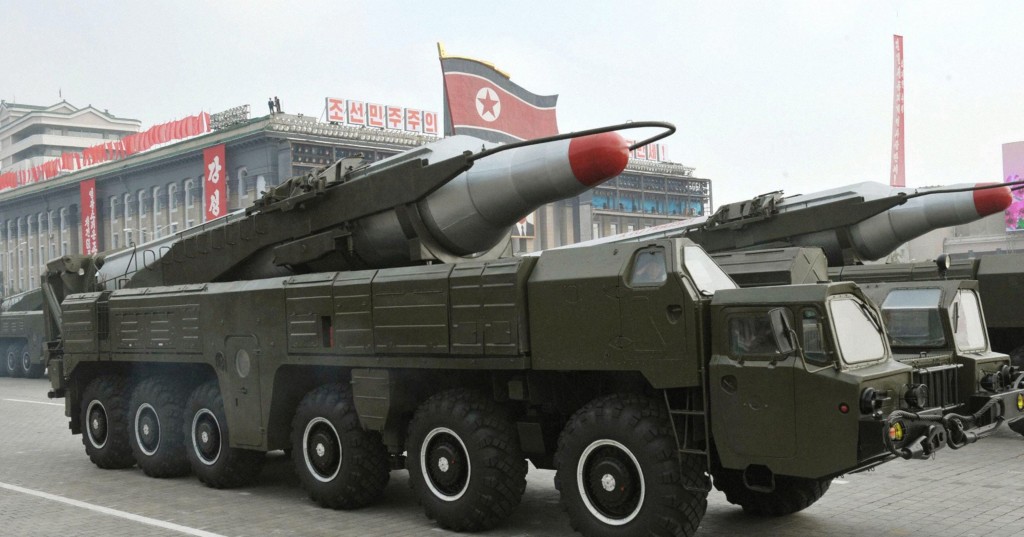
A Musadan intermediate-range missile is carried on a vehicle during a military parade in October 2010 in Pyongyang, North Korea. (Photo: KCNA via EPA)
By Tracy Connor
NBC News
April 12, 2013
Faced with annoyed allies and unblinking enemies, North Korea is likely to pull the plug on the current crisis by test-firing a missile or two and declaring victory ahead of a national celebration on Monday, analysts say.
After weeks of escalating tensions and threatening nuclear war, shooting off a missile that causes no damage will give Kim Jong Un the opportunity to save face with his people — and appease his military — without inviting serious retaliation, experts say. …
Observers caution, however, that with so much unknown about the political situation inside the secretive rogue state, it’s possible that North Korea could take more aggressive action that would goad a fed-up South Korea into a forceful reaction. …
Experts agree, however, that because the leadership dynamics in Pyongyang are murky, it’s impossible to know how far Kim, or whoever is running the country, will go.
Many believe Kim’s incessant saber-rattling — irritating even China and Russia — is an effort to recompense North Korea’s powerful military leaders and consolidate a weak power base. …
[Doug Bandow of the Cato Institute] said the danger of trying to predict North Korea’s next move is the lack of intelligence about who holds the upper hand there: Is it the party or the military? Is it young Kim, his aunt and uncle, or the generals? …
![]() Video
Video
Clapper: Family has some influence on young N. Korean leader (NBC News, April 11, 2013) — National Intelligence Director James Clapper discusses his assessment of North Korean leader Kim Jong Un while testifying on Capitol Hill Thursday. (01:28)
———————————
4/18/2013 Update
Obama Says He Doesn’t Believe North Korea Has Nuclear Missile
By Jethro Mullen
![]()
April 18, 2013
President Barack Obama has said he doesn’t believe North Korea can fit a nuclear warhead on a missile, casting strong doubt on an alarming assessment disclosed last week by the Pentagon’s intelligence arm.
And he warned the young North Korean leader Kim Jong Un that weeks of threats against the United States and South Korea had only served to isolate the regime further. …
Recent threats
Obama said that North Korea’s recent behavior under Kim Jong Un was both familiar and counterproductive.
“This is the same kind of pattern that we saw his father engage in and his grandfather before that,” he said, referring to the two previous North Korean leaders Kim Jong Il and Kim Il Sung. “Since I came into office, the one thing I was clear about was, we’re not going to reward this kind of provocative behavior. You don’t get to bang your spoon on the table and somehow you get your way.”
‘I’m not a psychiatrist’
Asked if he thought Kim Jong Un was unstable, Obama said, “I’m not a psychiatrist, and, I don’t know the leader of North Korea.”
But he said that “the actions they’ve taken, the rhetoric they’ve engaged in has been provocative.” …
——————————
5/7/2013 Update
Intelligence on North Korea, and Its New Leader, Remains Elusive

North Korean leader Kim Jong Un, left, on Feb. 16, 2012.
(Photo: David Guttenfelder / Associated Press)
By David E. Sanger and Choe Sang-hun
![]()
May 6, 2013
WASHINGTON — The black hole of North Korea intelligence gathering is getting blacker. …
When President Obama and South Korea’s new president, Park Geun-hye, meet for the first time at the White House on Tuesday, intelligence officials and outside experts say, they will be working, by necessity, from a deeply incomplete understanding of their common adversary. At a time when the United States has learned to conduct drone strikes with increasing accuracy in Pakistan, and direct cyberweapons at specific nuclear centrifuges deep under the Iranian desert, its understanding of North Korea’s leadership and weapons systems has actually gotten worse. …
The most recent intelligence failures included what administration officials now acknowledge was the C.I.A.’s initial judgment — now reversed — that the North’s young new leader, Kim Jong-un, was probably more interested in economic reform than in following his father’s and grandfather’s “military first†policy of bolstering the North’s missile and nuclear arsenals, and threatening to use them unless the world came to its door. …
In a sign of continuing confusion, the Defense Intelligence Agency — the Pentagon’s intelligence arm — recently declared with “moderate confidence†that the North can now shrink a nuclear warhead to fit onto one of those missiles, only to find its assessment disputed, in public, by both President Obama and the director of national intelligence. …
The depth of the inability to figure out what is happening was reflected on Thursday in an unclassified Pentagon report to Congress on North Korea’s military capabilities, which read much like it had been written in the late 1980s. It also cast, by implication, significant doubt that returning to negotiations would do much good: “In North Korea’s view,†it concluded, “the destruction of regimes such as Ceausescu, Hussein and Qaddafi was not an inevitable consequence of repressive government, but rather of a failure to secure the necessary capabilities to defend their respective autocratic regime’s survival.â€
But the more immediate concern is that Kim Jong-un could follow North Korea’s recent playbook and create another provocation — akin to the sinking of a South Korean navy ship in 2010 or the recent cyberattack on South Korean banks and news media companies. It took weeks of investigation before South Korea could blame the North for those past provocations. …
But the heart of the intelligence weakness centers on Mr. Kim, who is thought to be in his late 20s. The Chinese, who regularly invited his father, Kim Jong-il, to Beijing for consultations, praise and occasional dressing-downs, contend they have had few meetings with him. The only American to have dealt with him, quite famously, is Dennis Rodman, the former basketball star, whom the F.B.I. was reported to have debriefed after he returned from a recent trip to North Korea. …
In fact, in South Korea there is a theory that behind his baby-faced look and easy smile is a Machiavellian who already has top generals and party secretaries cowering at home, and is gambling that he can force Washington to accept the North as a nuclear power.
South Korean officials were surprised to conclude in recent months that despite Mr. Kim’s youth and inexperience, his government and party are exerting control over the military, which many regarded as too influential and too corrupt for that to occur. By some counts, two-thirds of the North’s senior generals have been demoted, replaced or shunted to less-powerful jobs; a few have been banished by the young leader. All have had to sign loyalty letters.
Yet the view that Mr. Kim has become as powerful as his father is not universal. “Who is in charge in North Korea? It’s hard to say,†said a senior South Korean policy maker. “How strong is Kim Jong-un? We don’t know exactly. Who is giving orders in Pyongyang? Apparently, it’s Kim Jong-un, but we are not sure about the inner-circle decision-making process.†[emphasis added]
It is a measure of the varying interpretations inside the United States government that, testifying before the Senate Armed Services Committee, Adm. Samuel J. Locklear III, the head of the Pacific Command, called Mr. Kim “impetuous†and “more unpredictable†than his father. But speaking to the same committee, Lt. Gen. Michael T. Flynn, the Defense Intelligence Agency’s director, called Mr. Kim a leader “firmly in control†who “possesses a charisma that his father did not,†and who understands realpolitik, including that he could not survive full-scale war. …
———————————
12/14/2013 Update
North Korea Executes Jang Song Thaek; More Purges May Follow
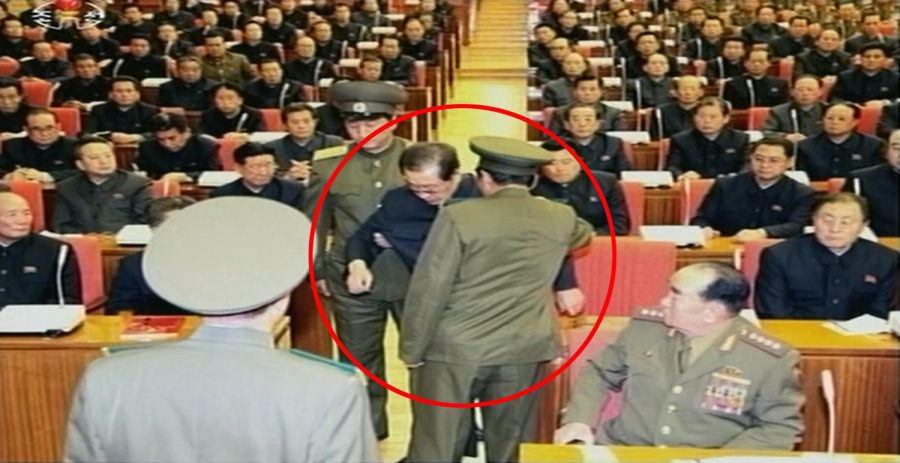
North Korean leader Kim Jong Un’s uncle Jang Song Thaek, center, is arrested during an enlarged meeting of the Political Bureau of the Central Committee of the Workers’ Party in Pyongyang on Sunday, Dec. 8, 2013. (KCTV / Yonhap via EPA)
By Eric Talmadge
![]()
December 13, 2013
PYONGYANG, North Korea — The execution of North Korean leader Kim Jong Un’s uncle brought a swift and violent end to a man long considered the country’s second-most powerful. But while Jang Song Thaek is now gone, the fallout from his bloody purge is not over.
In a stunning reversal of the popular image of Jang as a mentor and father figure guiding young Kim Jong Un as he consolidated power, North Korea’s state-run media on Friday announced he had been executed and portrayed him as a morally corrupt traitor who saw the death of Kim’s father, Kim Jong Il, in December 2011 as an opportunity to make his own power play.
Experts who study the authoritarian country, which closely guards its internal workings from both outsiders and citizens, were divided on whether the sudden turn of events reflected turmoil within the highest levels of power or signaled that Kim Jong Un was consolidating his power in a decisive show of strength. Either way, the purge is an unsettling development for a world that is already wary of Kim’s unpredictability amid North Korea’s attempts to develop nuclear weapons. …
The first appearance of the new narrative came out just days ago, when North Korea accused Jang, 67, of corruption, womanizing, gambling and taking drugs. It said he’d been eliminated from all his posts. Friday’s allegations heaped on claims that he tried “to overthrow the state by all sorts of intrigues and despicable methods with a wild ambition to grab the supreme power of our party and state.” …
South Korean intelligence officials say two of Jang’s closest aides have already been executed last month.
Narushige Michishita, a security expert at the National Graduate Institute for Policy Studies in Tokyo, suggested that Jang’s removal shows “that Kim Jong Un has the guts to hold onto power, and this might have shown his will to power, his willingness to get rid of anything that stands in his way.” …
Jang’s removal leaves no clear No. 2 under Kim, whose inner circle now includes Vice Marshal Choe Ryong Hae, Premier Pak Pong Ju, and Kim Yong Nam, the ceremonial head of state. …
State media said Jang was tried for treason by a special military tribunal and executed Thursday. …
Jang was seen prominently by Kim Jong Un’s side as he walked by his father’s hearse during his 2011 funeral. He was also a fixture at the new leader’s side as he toured the country.
The KCNA report was unusually specific in its accusations. In particular, it criticized Jang for not rising and applauding his nephew’s appointment to a senior position because Jang “thought that if Kim Jong Un’s base and system for leading the army were consolidated, this would lay a stumbling block in the way of grabbing the power.” …
Jang’s death could herald a “reign of terror,” including more purges, said Lim Eul Chul, a North Korea expert at South Korea’s Kyungnam University.
Another question mark is how the purge will impact North Korea’s relationship with its only major ally, China. Jang had been seen as the leading supporter of Chinese-style economic reforms and an important link between Pyongyang and Beijing. China has called Jang’s execution a domestic issue and has avoided further public comment. …
——————————
Related analysis

Jang Song-thaek during a North Korean court appearance on Dec. 12, 2013. He was executed that day. Photo credit Yonhap via Agence France-Presse — Getty Images / New York Times)
Korea execution is tied to clash over businesses (Choe Sang-Hun and David E. Sanger, New York Times, Dec. 24, 2013) — The execution of the uncle of Kim Jong-un, North Korea’s leader, had its roots in a firefight between forces loyal to Mr. Kim and those supporting the man who was supposed to be his regent, according to accounts that are being pieced together by South Korean and American officials. The clash was over who would profit from North Korea’s most lucrative exports: coal, clams and crabs. … Full report
——————————
3/5/2014 Update
Related report
 |
U.S. Department of Defense Office of the Assistant Secretary of Defense (Public Affairs) News Release |
On the Web:
http://www.defense.gov/releases/release.aspx?releaseid=16569
IMMEDIATE RELEASE
Release No. NR-113-14
March 5, 2014
DoD Releases Report on North Korea’s Military and Security Developments
The Defense Department published a congressionally mandated, unclassified report on the Military and Security Developments involving the Democratic People’s Republic of Korea today.
The report is posted at http://www.defense.gov/pubs/North_Korea_Military_Power_Report_2013-2014.pdf.
——————————
5/1/2017 Update
Trump: I’d be ‘honored’ to meet Kim Jong Un under ‘right circumstances’ (Jeremy Diamond and Zachary Cohen, CNN, May 1, 2017) — President Donald Trump said Monday he would be willing to meet with North Korean leader Kim Jong Un “under the right circumstances” to defuse tensions over North Korea’s nuclear program. “If it would be appropriate for me to meet with him, I would absolutely, I would be honored to do it,” Trump told Bloomberg News in an interview Monday. … White House press secretary Sean Spicer, however, said later on Monday that the US would first need to see changes in North Korean behavior before a potential sit-down. … Spicer also offered an explanation for Trump’s view, expressed to CBS [link to transcript added], that Kim is a “smart cookie.” …

———————————
8/15/2017 Update
Psychological Profile of Kim Jong-Un: Would He Really Attack Guam?

By Alex Berezow
The American Council on Science and Health
August 8, 2017
Winston Churchill once said that Russia is “a riddle, wrapped in a mystery, inside an enigma.” That’s in many ways still true. However, Russia is a complete open book compared to the Hermit Kingdom.
The latest development in the ongoing saga of North Korea is Kim Jong-Un’s threat to attack Guam. If he was capable of that (and he very well might be), would he actually do it?
That sort of question is the domain of intelligence analysts and others who engage in psychological profiling. One public source of information on this is the Unit for the Study of Personality in Politics, a research project directed by psychology professor Aubrey Immelman. The unit has a page dedicated to Kim Jong-Un, which has been updated sporadically as more information has become available.
The team’s initial assessment, published in April 2013, was that Mr. Kim is a congenial-cooperative leader, displaying traits such as agreeableness, charm, and a need for external approval. The team concluded that Mr. Kim’s personality was inconsistent with North Korea’s continued belligerence, which made the profilers wonder if somebody else was actually running the country.
This was a perfectly decent psychological profile, but it certainly seems to be wrong. In August 2012, a writer for Foreign Policy warned, “The North Korean regime will not change because Little Kim studied in Switzerland, likes Mickey Mouse, and has a hot wife.” Indeed, North Korea’s aggression has only increased in the years since.
Kim Jong-Un: An Updated Psychological Profile
In April of this year [2017], Prof. Immelman’s team updated Mr. Kim’s profile with another detailed assessment. Once again, they found that the dictator’s personal psychological profile is rather benign and similar to that of recent U.S. presidents, specifically in areas such as aggressiveness and cooperativeness. In fact, the authors conclude that “at worst, [he has] only a moderate predisposition to aggressive behavior.” [Note: New update published April 2018]
This is difficult to believe, however, given that Mr. Kim murdered his half-brother, Kim Jong-Nam, with VX nerve agent in February. But the profilers would likely warn us that it is very easy to conflate an individual leader’s psychological profile with the actions of the regime. It is possible, for instance, that Mr. Kim’s advisors told him to murder his half-brother, and he did so. Without access to classified information — which the authors do not have — trying to decipher the behavior of such an enigmatic figure is like reading tea leaves.
Would Kim Jong-Un Attack Guam?
What can a psychological profile tell us about whether Mr. Kim would attack Guam? Not much, it seems. Even if it is true that Mr. Kim is not personally aggressive, it has become clear that he has allowed his regime to behave that way. North Korea is armed to the teeth, and it may even possess a biological weapons program.
When a person with big guns and bombs makes threats, we should take him seriously. We don’t need a psychological profile to reach that conclusion.
Article reprinted on this site, with annotations, April 24, 2018.
———————————
8/15/2017 Update
Inside Kim Jong-un’s bloody scramble to kill off his family (Jean H. Lee, Esquire, Aug. 11, 2017) — While the world watches North Korea launch missiles, the very paranoid supreme leader has been busy eliminating anyone in his family who might knock him off the throne. … Full report
————————————————
Topical reports on this site

North Korean leader Kim Jong Un rides a horse in this undated still image taken from video released by North Korean state television KRT on Jan. 8, 2012. North Korea’s state television broadcast a new documentary of its supreme commander Kim Jong Un on his birthday, seen as an effort to idolize the young and untested leader. (Photo: KRT via NBC News)
President Donald Trump to Meet North Korea’s Kim Jong-un (March 9, 2018)
North Korea Steps Up Nuclear Threat Against U.S. (Jan. 27, 2013)
Looming North Korean Nuclear Threat (Jan. 11, 2011)
Winds of War in Korea (Nov. 25, 2010)
Perilous Flare-Up of Korean War (Nov. 24, 2010)
North Korea ‘Very Dangerous’ (Nov. 22, 2010)
Kim Jong-un Succession in North Korea (Oct. 11, 2010)
North Korea Threatens ‘Sacred War’ (July 23, 2010)
No Chinese Support on North Korea (May 30, 2010)
North Korea Fraud Charge (May 28, 2010)
North Korean Saber-Rattling (May 20, 2010)
Iran, North Korea Threat Level Rises (Dec. 13, 2009)
North Korea Ready to Deal? (July 26, 2009)
Independence Day Missile Barrage (July 4, 2009)
North Korea Nuclear Threat (June 16, 2009)
Kim Jong Il Threat Assessment (May 31, 2009)
Tensions Rise in Korean Peninsula (May 30, 2009)
Tense Stand-off with North Korea (May 28, 2009)
North Korea Warns of Possible Military Action (May 27, 2009)
North Korea Launches Rocket (April 5, 2009)
U.S. Warns North Korea on Missiles (Feb. 17, 2009)
Korea Headache Looms for Obama (Jan. 28, 2009)
Obama Faces Daunting Challenges (Nov. 6, 2008)
Leave a Reply
You must be logged in to post a comment.

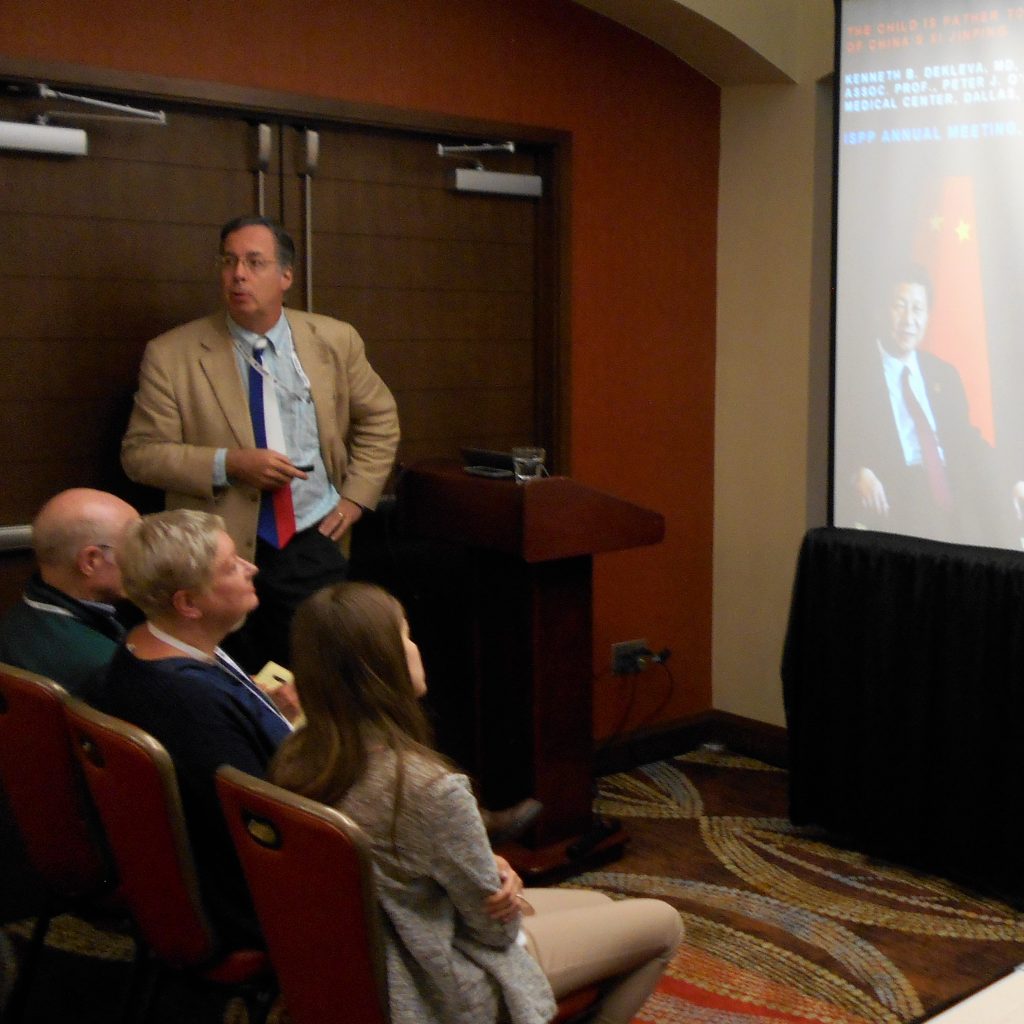
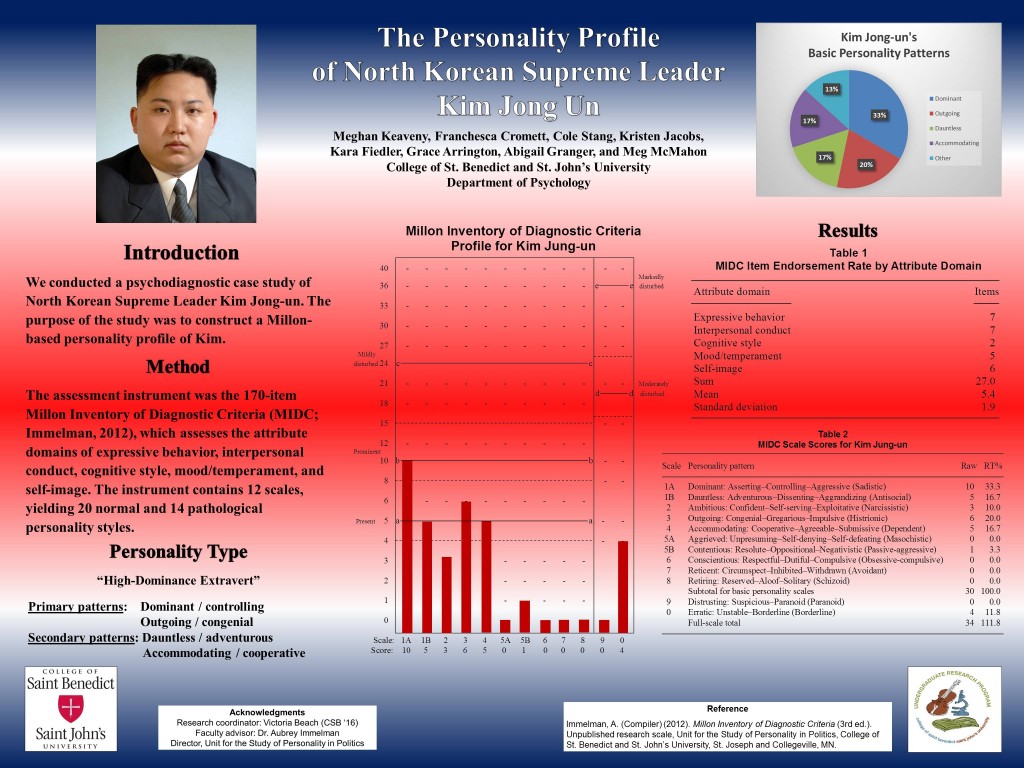
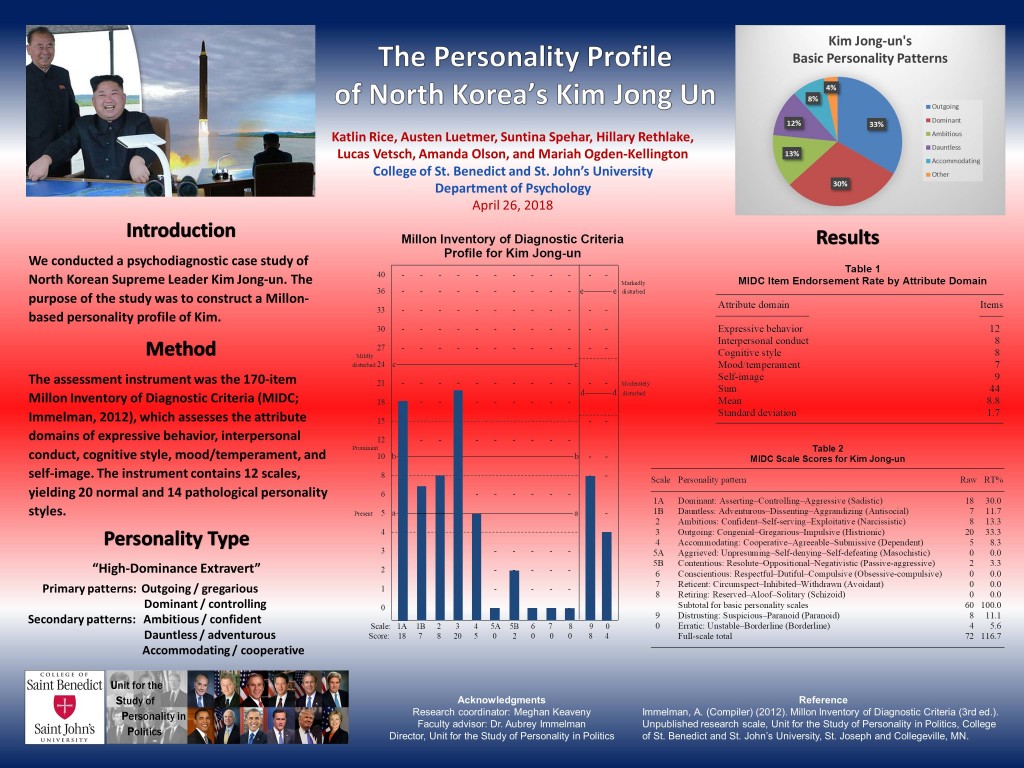
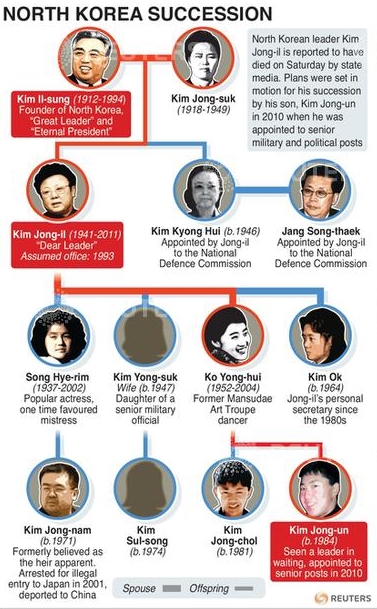
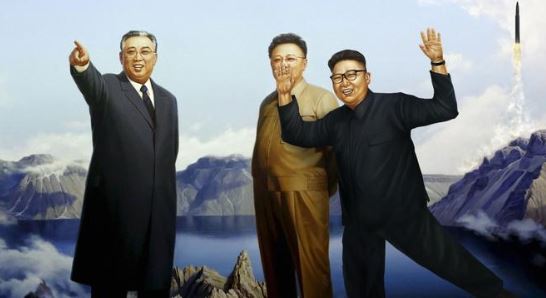

April 10th, 2013 at 10:53 am
[…] North Korea Threat Assessment: Psychological Profile of Kim Jong-un (April 8, 2013) […]
April 10th, 2013 at 11:03 am
[…] North Korea Threat Assessment: Psychological Profile of Kim Jong-un (April 8, 2013) […]
April 10th, 2013 at 11:12 am
[…] North Korea Threat Assessment: Psychological Profile of Kim Jong-un (April 8, 2013) […]
March 1st, 2017 at 12:46 am
Excerpt from “A Poor Soul and Purgatory” by Bernard Rowan, The Korea Times, March 1, 2017:
I enjoyed but found surprising a discussion of Kim Jong-un’s personality, summarized on personality-politics.org, the website of the Unit for the Study of Personality in Politics. It describes Kim’s personality as a combination of congeniality and cooperativeness. This benign description stands in only seeming contradiction to another appraisal by Mark Bowden in Vanity Fair. Kim comes across there as a more pleasure-seeking if present-day autocrat in style than some of his 20th century counterparts. He’s no less lost in this farcical family succession to lead a nation of totalitarian evil.
Kim runs a program, and the program begins to run him. The latter tragedy counterbalances the former comedy, but the rub is much injustice and death, among other crimes. Within the context of the North Korean state and political culture, the program condemns Kim to a life of realities that frustrate his inner child, shall we say. …
Full opinion column: http://www.koreatimes.co.kr/www/opinion/2017/02/625_224869.html
March 6th, 2017 at 9:24 am
Informative article about U.S. flexible deterrent options to counter the DPRK’s nuclear ambitions:
“Trump Inherits Secret Cyberwar on North Korea” by David E. Sanger and William J. Broadmarch, New York Times (p. A1), March 5, 2017 » https://www.nytimes.com/2017/03/04/world/asia/north-korea-missile-program-sabotage.html
Excerpts:
An examination of the Pentagon’s disruption effort … found that the United States still does not have the ability to effectively counter the North Korean nuclear and missile programs. Those threats … pose such a danger that Mr. Obama, as he left office, warned President Trump they were likely to be the most urgent problem he would confront. …
[President Trump] could order the escalation of the Pentagon’s cyber and electronic warfare effort, but that carries no guarantees. He could open negotiations with the North to freeze its nuclear and missile programs, but that would leave a looming threat in place. He could prepare for direct missile strikes on the launch sites, which Mr. Obama also considered, but there is little chance of hitting every target. He could press the Chinese to cut off trade and support, but Beijing has always stopped short of steps that could lead to the regime’s collapse. …
Three generations of the Kim family have dreamed that their broken, otherwise failed nation could build its own nuclear weapons, and the missiles to deliver them, as the ultimate survival strategy. With nukes in hand, the Kims have calculated, they need not fear being overrun by South Korea, invaded by the United States or sold out by China. …
August 12th, 2017 at 6:44 am
[…] For the latest North Korea threat assessment, refer to North Korea Threat Assessment: Psychological Profile of Kim Jong-un. […]
August 12th, 2017 at 6:47 am
[…] For the latest North Korea threat assessment, refer to North Korea Threat Assessment: Psychological Profile of Kim Jong-un. […]
December 25th, 2019 at 9:29 pm
[…] North Korea Threat Assessment: The Psychological Profile of Kim Jong-un […]
May 3rd, 2020 at 6:51 am
[…] North Korea Threat Assessment: The Psychological Profile of Kim Jong-un […]